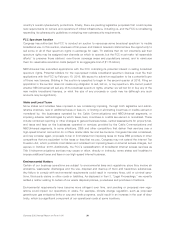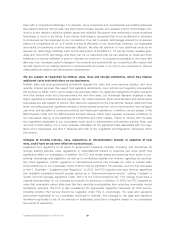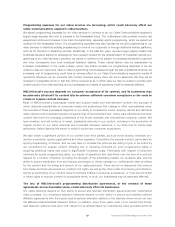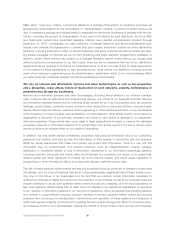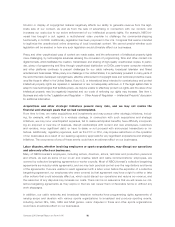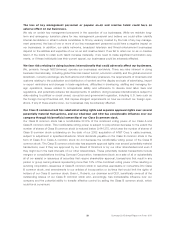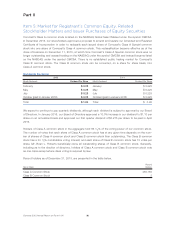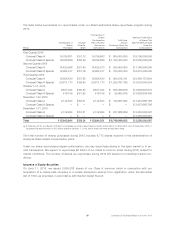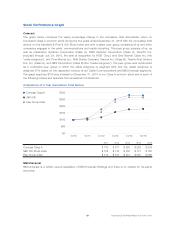Comcast 2015 Annual Report Download - page 32
Download and view the complete annual report
Please find page 32 of the 2015 Comcast annual report below. You can navigate through the pages in the report by either clicking on the pages listed below, or by using the keyword search tool below to find specific information within the annual report.Programming expenses for our video services are increasing, which could adversely affect our
Cable Communications segment’s video business.
We expect programming expenses for our video services to continue to be our Cable Communications segment’s
largest single expense item and to increase in the foreseeable future. The multichannel video provider industry has
experienced continued increases in the cost of programming, especially sports programming, which we expect will
continue for the foreseeable future. Our programming expenses may also increase as we add programming to our
video services or distribute existing programming to more of our customers or through additional delivery platforms,
such as On Demand or streaming services. Additionally, in the past few years, we have begun paying certain local
broadcast television stations in exchange for their required consent for the retransmission of broadcast network pro-
gramming to our video services customers; we expect to continue to be subject to increasing demands for payment
and other concessions from local broadcast television stations. These market factors may be exacerbated by
increased consolidation in the media industry, which may further increase our programming expenses. If we are
unable to raise our customers’ rates or offset programming cost increases through the sale of additional services, the
increasing cost of programming could have an adverse effect on our Cable Communications segment’s results of
operations. Moreover, as our contracts with content providers expire, there can be no assurance that they will be
renewed on acceptable terms or that they will be renewed at all, in which case we may be unable to provide such
content as part of our video services, and our businesses and results of operations could be adversely affected.
NBCUniversal’s success depends on consumer acceptance of its content, and its businesses may
be adversely affected if its content fails to achieve sufficient consumer acceptance or the costs to
create or acquire content increase.
Most of NBCUniversal’s businesses create and acquire media and entertainment content, the success of
which depends substantially on consumer tastes and preferences that change in often unpredictable ways.
The success of these businesses depends on our ability to consistently create, acquire, market and distribute
cable network and broadcast television programming, filmed entertainment, theme park attractions and other
content that meet the changing preferences of the broad domestic and international consumer market. We
have invested, and will continue to invest, substantial amounts in our content, including in the production of
original content on our cable networks and broadcast television networks, in our films and for theme park
attractions, before learning the extent to which it would earn consumer acceptance.
We also obtain a significant portion of our content from third parties, such as movie studios, television pro-
duction companies, sports organizations and other suppliers. Competition for popular content, particularly for
sports programming, is intense, and we may have to increase the price we are willing to pay or be outbid by
our competitors for popular content. Entering into or renewing contracts for such programming rights or
acquiring additional rights may result in significantly increased costs. Particularly with respect to long-term
contracts for sports programming rights, our results of operations and cash flows over the term of a contract
depend on a number of factors, including the strength of the advertising market, our audience size, and the
ability to secure distribution from and impose surcharges or obtain carriage on, multichannel video providers
for the content and the timing and amount of our rights payments. There can be no assurance that revenue
from these contracts will exceed our costs for the rights, as well as the other costs of producing and distribut-
ing the programming. If our content does not achieve sufficient consumer acceptance, or if we cannot obtain
or retain rights to popular content on acceptable terms, or at all, our businesses may be adversely affected.
The loss of NBCUniversal’s programming distribution agreements, or the renewal of these
agreements on less favorable terms, could adversely affect its businesses.
Our cable networks depend on their ability to secure and maintain distribution agreements with multichannel
video providers. Our broadcast television networks depend on their ability to secure and maintain network
affiliation agreements with third-party local broadcast television stations in the markets where we do not own
the affiliated local broadcast television station. In addition, every three years, each of our owned local broad-
cast television stations must elect, with respect to its retransmission by multichannel video providers within its
29 Comcast 2015 Annual Report on Form 10-K







